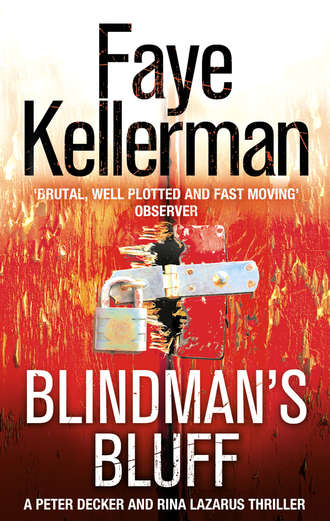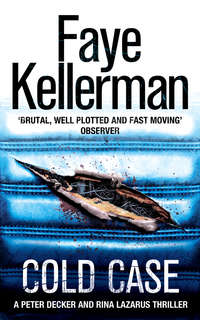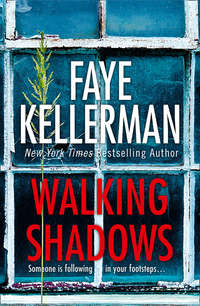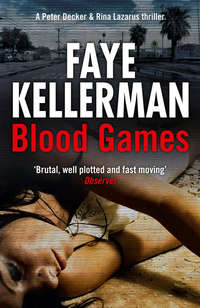
Полная версия
Blindman’s Bluff
Of course, he could discern simple things like race and ethnicity, but who among the living could also zero in on social class and educational level in a single breath? How many fellow human beings could detect whether the person was happy or sad—no biggie there—but also whether he or she was angry, peeved, jealous, annoyed, wistful, sentimental, considerate, empathetic, industrious, and lazy? And not by what they said, but how they said it. He could distinguish between nearly identical regional American accents, and he had a magic ear for international accents, too.
In his world, there was no need for visuals. The eye was a deceptive thing. He’d been given an otherworldly gift, not to be squandered on trivial things like a parlor game.
Name that accent.
People were such assholes.
His PDA buzzed. He fished it out of his pocket and pushed a well-worn button. The machine read the text message aloud in a staccato electronic voice: “See U for usual lunch.” He turned off the handy-dandy portable and stowed it back in his pocket. The time was twelve-thirty, the place was a sushi bar in Little Tokyo, and the date was Dana.
The day was shaping up to be a good one. Taking his seat on the bench, he adjusted his designer sunglasses, turned his head in the direction of the jury box, and flashed the good citizens of Los Angeles a blinding smile of perfectly straight white teeth.
Showtime!
AFTER RECEIVING INSTRUCTIONS from the judge not to talk about the case, the jury filed out of the courtroom.
The woman in front was named Kate and that’s all that Rina knew about her. She looked to be in her thirties with pinched features, clipped blond hair, and hoop earrings dangling from her earlobes. She turned to Rina and said, “Ally, Ryan, and Joy are going to the mall. You want to join us for lunch?”
“I brought a sack lunch, but I’d love to sit with you. Anything to get out of this building.”
“Yeah, who’s really in jail?” Kate smiled. “I’m going to use the little girls’ room, and Ryan and Ally have to make a couple of phone calls. We’re all meeting outside in about ten minutes.”
“Sounds good.” As Rina pushed open one of the double glass doors of the criminal courthouse, a blast of furnace air hit her face, and the roar of traffic filled her ears. The asphalt seemed to be melting with heat waves shimmering in the smog. The only shade in the area was provided by the multistory buildings—not much shadow in the noonday sun—and a row of hardy trees that seemed pollution resistant.
She dialed Peter’s cell expecting to leave a message. She was delightfully surprised when he picked up.
“How’s it going?” she asked.
“I’m still alive.”
“That’s a good thing. Where are you?”
“I’m with Sergeant Dunn and we’re headed for St. Joseph’s hospital intensive care unit. Gil Kaffey is out of surgery.”
“That’s good news. I read the story this morning, although I’m sure it’s out of date already. You’ve got your hands full.”
“As always.”
“I love you.”
“I love you, too.”
“Am I going to see you anytime soon?”
“Eventually I’ll have to sleep.”
“Do you think you’ll make it to Hannah’s choir recital?”
A pause. “When is it again? Tomorrow at eight?”
“It’s actually tonight at eight. The choir teacher changed the date and Hannah forgot to tell me.”
“Oh boy.” Another pause. “Yes, I will make it; however, I will not vouch for my appearance or my hygiene.”
Rina felt relieved. “I’m sure that all Hannah wants is to see your face.”
“That will happen. Just do me a favor. Poke me in the ribs if you see my eyes start to close. How’s it going over there in beautiful downtown L.A.?”
“Summer is upon us.” She wiped sweat off her forehead with the back of her hand. “I shouldn’t have worn my sheytl today. It’s too hot for a wig.”
“Take it off. I won’t tell.”
Rina smiled. “So I’ll meet you at school?”
“That would make sense.”
“Should I bring you dinner?”
“That would also make sense. Gotta run. The sterile hallways and the antiseptic smells of St. Joe beckon, but don’t be jealous of my good time. I’m sure you have your own party planned within the vaunted walls of justice.”
“Actually, we’ve got some camaraderie going on. A group of us are going to the food mall for lunch across the street from the courthouse.”
“Well, aren’t you the fortunate daughter.”
“We’re doing our civic duty for fifteen dollars a day. Even LAPD pays more than that.”
“Want to switch places?”
“Not on your life. I prefer the living to the dead.”
FOUR
IT TOOK MARGE and Decker nearly forty-five minutes to make it to the hospital in light traffic. Had Gil Kaffey been conscious during the ambulance ride, he would have had a lot of thinking time.
What would he remember? Sometimes in traumatic incidents, retrograde amnesia set in: nature’s inoculation against further pain.
St. Joe’s medical complex consisted of the medium-sized hospital in four wings and an equal number of professional office buildings. It took a few passes to find an open parking space, and it was a tight squeeze at that. Marge maneuvered the Crown Vic with aplomb, and within a few minutes they were showing their badges at the nurses’ station that manned the glassed-in intensive care unit. Before they were permitted inside, they needed to get Kaffey’s doctors to sign them in. It took about twenty minutes to locate one of Kaffey’s surgeons.
The doctor in charge, named Brandon Rain, was a beefy man in his thirties with broad shoulders and ham-hock forearms. He gave them an update. “Kaffey is heavily sedated. His body has gone through a terrible ordeal, so not more than a few minutes.”
“How bad is it?” Decker wanted to know.
“The bullet cracked through a couple of floating ribs and caused some bleeding. It took him a while to get here and that area is very vascular. A little more central and the slug would have hit the spleen. He would have bled out.” The surgeon’s pager sprang to life. He checked the window on his cell. “I’ve got to run. Not more than a few minutes.”
“Got it,” Decker said.
“Have you heard from the family?” Marge asked.
“Not yet, but I’m sure I will,” Rain told her. “Did you happen to notice the Kaffey building when you came in?”
“I did,” Decker said. “I take it the family holds some sway?”
“Let me put it this way,” Rain said. “They’re charitable people. They’re also moneyed people. In this economy, that’s a winning combination.”
GIL KAFFEY HAD tubes in his nose, tubes in his arms, and tubes in his stomach. His face was bruised and swollen, his eyes were bloodshot, and his lips dry and cracked. Marge had pulled up his picture on her laptop and the man in front of them bore no resemblance to the good-looking, self-confident guy on the computer screen. Kaffey’s heart rate was steady, and an arm cuff inflated every ten minutes to get a BP reading. Gil was conscious but was very groggy. Decker wasn’t looking for a lengthy interview. All he wanted was a name. It was the first question he asked.
Do you know who shot you?
No one was surprised when Kaffey shook his head no. His heart rate jumped as he tried to speak. “Four…”
The ICU nurse tossed the detectives a meaningful glance. “Just a few minutes.”
“Got it,” Decker said. “Did you say four, Mr. Kaffey?” When Gil nodded, he said, “Were there four people who attacked you?”
Kaffey shook his head. “For an…”
They waited. Nothing else came and Kaffey closed his eyes.
Decker said, “Do you mean the number four?”
Another shake. “For…in.”
Decker said, “Foreign? As in foreign-speaking?”
Kaffey’s heart rate quickened and his eyes opened slowly. He gave them a nod.
“The people who attacked you weren’t speaking English.”
Another nod.
“Do you know the language?” Marge asked him.
“No…dark…”
“Dark?” Marge repeated. “The room was dark?”
A shake of the head.
Marge tried again. “The men who attacked you were dark complexioned?”
Again the eyes opened. Another nod.
“Were they black?”
“No…dark…”
“Dark,” Decker said. “Dark like Hispanic or maybe Mideastern or Mediterranean?”
A nod.
“But you didn’t recognize the language they were speaking?”
No answer.
Marge asked him, “How many men do you remember?”
“May…be…three…four…” The eyes closed. “Tired.”
The nurse broke in. “He’s due for some pain medications. I need to call in the doctor.” She rang a bell. “You should probably go now.”
“You’re the boss.” Decker handed the nurse several cards. “When he’s a bit more awake, please call us. I know that his health is paramount, but the more information we have, the better our chances of solving the crime.”
“See…” Gil said.
Marge and Decker whipped their heads in Kaffey’s direction.
“See what?” Marge asked.
He shook his head. “See…yes.”
The detectives waited for more.
“Yes…see.”
Decker smoothed his mustache, his version of stroking a beard. He did it when he was thinking hard. “Do you mean sí like the Spanish word for yes?”
“One of them.” Labored breathing. “I heard him say sí.”
RINA TOOK HER roast beef sandwich from a plastic baggie. It was on an onion roll with lettuce, tomato, and pickles.
Joy eyed it enviously. “That looks good.”
“Want a bite?” Rina offered.
“No, I have my fast food. What would my system do without all that added sodium?”
The mall was an enclosed series of multiple fast-food outlets designed to appeal to the teeming mass of humanity that the city employed. Although ripe with the smell of cooking oil and meat, it was air-conditioned and on days where the mercury was hovering in the nineties, one could put up with a bit of stale grease.
They were a motley crew. Joy was a secretary for a metal recycling company. She was in her sixties, chunky with dyed red hair and rouged cheeks. Ally had just graduated from community college with a major in communications and was excited about her upcoming twenty-first birthday party. Everyone on the jury was invited. Ally’s dark hair had a blond chip running down the middle like a skunk. Ryan was in his late thirties, married with three boys. He was a contractor and was happy to get off the job for a couple of days. He had been working on a big house and the clients were driving him crazy. Kate was the sole woman in a house of former air force men. Her two boys were now in their thirties and worked as pilots for FedEx. Her husband had put in thirty years with United Airlines.
“We went on a lot of great vacations,” Kate said.
“I bet,” Rina said. “We took an Alaskan cruise last year. It was heavenly.”
“Alaska’s beautiful,” Ryan said. “I try to go fishing every summer up there.”
“Salmon fishing?”
“You got it.”
Joy said, “Aren’t you worried about grizzly bears?”
“You go fishing when there’s lots of fish. When the grizzlies are busy eating fish, they don’t bother you.”
Joy said, “Did you see that awful documentary where the guy and his girlfriend got attacked and were eaten by a grizzly bear?”
“Ugh,” Ally said. “When was this?”
“Several years ago,” Rina said.
Ryan said, “They are wild animals. You’ve got to have respect.”
“Ugh!” Ally repeated.
“Probably not as yucky as today’s headlines,” Joy said. “Did you read about what happened at that huge mansion in the Valley?”
“Coyote Ranch,” Ryan said. “The Kaffeys. They’re major developers.”
“I was sick when I read that…It’s just horrible! Three people dead!”
Joy was just a font of distasteful news. And she delivered it with such glee. Rina didn’t bother to correct her on the body count. Keeping one’s mouth shut was always a good option.
“They must have had an elaborate alarm system,” Joy went on. “It had to be an inside job.”
Kate said, “I certainly wouldn’t want to be on that jury. I’d hang the bastards.” She turned to Rina. “Where does your husband work?”
“In the West Valley.”
“Oh…okay.”
Joy’s eyes widened. “So it’s your husband’s district?”
“Yes.”
“Is he involved?”
“I think all of the West Valley is involved. The victims are high-profile people. It’s going to get a lot of attention.”
Joy leaned over. “What do you know about it?”
“The same as you do: what I’ve read in the morning papers.”
Ally smiled. “She’s going mute.”
Rina smiled back and took a bite of her sandwich. Then she changed the subject. “Does anyone know who that guy in the spectator seating is?”
“The guy with the shades and the Tom Cruise smile?” Kate said. “Who is he?”
“I don’t know, but he’s been in and out of the courtroom since the voir dire.”
“Maybe he’s a reporter,” Ally suggested.
Kate said, “I haven’t seen a notepad.”
“Lots of ’em use tape recorders. That’s what I did when I had to do interviews for journalism.”
Kate shrugged, “Maybe.”
“It’s a little weird,” Joy said. “He just sits and smiles at us. Is he trying to intimidate us or something?”
“I don’t know,” Rina said. “Every time I sneak a glance at him, he’s straightening his tie or wiping lint off his suit. He dresses nicely. He obviously cares about his appearance.”
Ryan said, “Tell you one thing. He isn’t involved with manual labor. Soft hands.”
“Maybe he’s like a private attorney,” Joy said. “The guy on trial can use someone better than that schlump he has.”
“Yeah, he is pretty schlumpy,” Ally said.
Kate said, “We probably shouldn’t be talking about the case.”
“We’re not talking about the case,” Joy said, “just the schlumpy attorney.”
“Still, Kate has a point,” Rina said. “So what’s the guess on who Mr. Smiles is?”
Shrugs all around.
“I just hope he’s not a stalker,” Ally said quietly.
“He’s a little out in the open to be a stalker,” Rina said.
Joy said, “I once had a stalker. Some guy at work. Wouldn’t leave me alone.”
Ally said, “What did you do?”
“I repeatedly told him to bug off. When he wouldn’t, I threw coffee in his face.” When the group stared at her, dumbfounded, Joy said, “It was lukewarm. But I made my point. He never bothered me again.”
“You’re tough,” Ryan said. “Tougher than my clients.”
Joy patted his hand with maternal affection. “I may be a grandma, but that still doesn’t mean you can mess with me.”
Ally said, “Did you bring up the stalker at the voir dire when they asked about experience with crime?”
“Nah, I didn’t bring it up. It wasn’t a crime really. Just bad behavior. Hell, if they eliminated people based on bad behavior, the system wouldn’t have anyone left for jury duty.”
FIVE
SINCE IT WAS L.A., the scene might have been a generic opening shot for any of the many hospital shows that had graced the small screen over the years. Men were shouting orders as they rushed down the hallways with anxious nurses in tow. Except in this case, the guys weren’t in scrubs but suits and ties with an entourage of walking-around guys. The nurses were barking commands at the executive group, but the men clearly weren’t listening. Someone mentioned calling security.
The crew charged past Marge and Decker as the detectives exchanged glances.
“The Kaffey family?” Marge asked.
Decker answered, “Maybe we should intercede before someone throws them out.”
“Not likely being as we’re in the Kaffey Emergency Services Building.” Marge watched the confrontation in front of the ICU. “We should put a guard in front, Loo. We don’t know if the family is involved. Maybe they’ve come back for unfinished business.”
“Absolutely.” Decker took in a deep breath and let it out. “Let’s go.”
They walked over to the sizable assemblage, the voices loud and demanding. The revolt was led by a young man in his twenties, backed up by an older man in his late fifties. Decker weaved himself into the hubbub. “Can I help someone?”
The young man glared at Decker with furious eyes. He was medium sized with a thick swatch of sandy hair. If Decker squinted hard enough, he could see some common fraternal features with Gil.
“Who the hell are you?”
“Detective Lieutenant Peter Decker, LAPD. This is Detective Sergeant Marge Dunn. She’s from Homicide.” He held out his hand. “Are you Grant Kaffey?”
The eyes narrowed. “Let me see some ID.”
Decker opened the billfold, and both the young and older man scrutinized the badges. When they were satisfied, the older one said, “What the hell is going on?”
“How about some introductions first? We’d like to know who we’re talking to.”
The older man spoke up. “Mace Kaffey. I’m Guy’s brother.” He ran his hand over a face shadowed with grief, fatigue, and grizzle. “This is Grant Kaffey. We want to talk to Gil.”
“Gil is very heavily sedated right now. He was wounded—”
“How bad?” The younger one looked horrified. “Was he shot?”
“He was shot.”
“Oh God,” Mace exclaimed.
Decker said, “How about if we find a quiet room and get some coffee? Sergeant Dunn and I will try to bring you up to speed.”
“When do I get to see my brother?” Grant demanded.
“That’s not my decision, Mr. Kaffey, that’s up to the doctor.” Decker turned to one of the nurses. “Can we get an empty room here?”
The head nurse—a stout woman with a stern expression named Jane Edderly—came charging into the commotion. “There are way too many people here. It’s blocking the hallways.”
Grant said, “Harvey, get us some coffee. Engles and Martin, you two stay here with us. The rest of you wait downstairs.” Upon hearing orders, the underlings scattered. The younger Kaffey was still glaring at Decker. “I want to see my brother now!”
Decker turned to the head nurse. “Can you page Dr. Rain, please?”
“He’s in surgery,” Jane huffed.
“Do you know when he’ll be out?”
“I have no idea! You’re still blocking the aisles.”
Grant started to speak, but Decker held up a hand. “Nurse Edderly, this is Grant Kaffey and Mace Kaffey. They’ve just undergone a terrible shock—the loss of Grant’s father and mother and Mace’s beloved brother and sister-in-law. I need to talk to them. Surely there’s an empty room in the Kaffey building where we could talk.”
Jane’s eyes widened. She finally got it. “Let me look and see what’s available.”
“Thank you, I appreciate your cooperation.” Decker turned to the men. “I’m very sorry for your losses. Tragedy of this kind just defies words.”
Mace Kaffey ran his hands over a haggard face—exhausted eyes and deep-set wrinkles. The man was portly. “What happened?”
“We don’t have all the details right now. As soon as we find a room, I’ll fill you in on what I do know.”
“Goddamn ranch!” Grant started pacing. “Too many fucking people going in and out. Impossible to keep track of all of them. I told my father that.”
“How many people were under your father’s personal employ?” Marge asked.
“Huh?” Grant stopped pacing. “At the ranch?”
“Yes, sir.”
“Who knows? Too many people with too many keys. It’s just ridiculous!”
Decker said, “I heard that the staff was vetted pretty carefully.”
“Whatever that means! Who does private security anyway? They’re either losers who couldn’t make it into the police or ex-policemen who were thrown out for being on the take. Or with Dad, it was reformed delinquents who tugged on his misguided heartstrings.”
Again, Marge and Decker exchanged glances.
Nurse Jane Edderly had returned. “We found a room for you. Please follow me.”
“Thank you for helping out,” Decker said.
Grant said, “Yeah, thanks for giving me a room in my family’s building after a six-hour emergency flight to tend to my murdered parents. Thanks a whole fucking load, Nurse Edderly!”
The nurse glanced at him but remained silent.
Mace put a hand on Grant’s shoulder, but he shook it off. The space was small but roomy enough for the four of them to sit while Grant’s remaining two lackeys had to stand. Within a few minutes, everyone was drinking bad coffee. Mace looked defeated, but Grant was still on youthful fire.
“When can I see my brother?”
“Mr. Kaffey…” Decker paused. “Would you mind if I called one of you by your first name since both of you are Mr. Kaffey?”
“Call me Mace,” the older man said.
“I frankly don’t care what the fuck you call me. Just tell me what’s going on. And who do I have to screw to see my brother?”
Marge said, “We saw your brother about twenty minutes ago. He was in a lot of pain, so the doctor upped the sedation. He’s out of it. Your seeing him is not a police decision but a medical one.”
“Then get the doctor over here!”
“I tried to have him paged,” Decker said. “He’s in surgery.”
“Grant, let’s just hear what the police have to say,” Mace told him.
Marge turned to Grant. “You’re right in several respects about the ranch’s security. There was an obvious breach. Two of the guards were homicide victims, but there are two others who were on duty who’re missing. We’re working with a man named Neptune Brady. Do you know him?”
Mace said, “Neptune has been under Guy’s employ for a while…first in the business and then he took him as his personal head of security.”
“Why?” Grant asked. “Do you suspect him?”
“Just gathering information,” Decker repeated. “What did Brady specifically do in the business?”
“I’m not sure,” Mace said. “I’m East Coast-based.
Grant said, “He’s a licensed private detective. He did some freelance work. There were some numbers not adding up in the accounting office—embezzling. Dad put Neptune on the cases and he did good work. So Dad being Dad offered him a full-time job at the Coyote Ranch as head of security at an exorbitant salary.”
“He was a generous guy?” Marge asked.
“Generous one minute, a tightwad the next. You never knew how his pocketbook would swing. Dad was paying Neptune a fortune, but Dad insisted that was how you kept them loyal.”
“Do you get along with Mr. Brady?”
Grant said, “Neutral. We don’t have much to do with each other.”
“What about you?” Marge asked Mace.
“I barely know him. You think he did it?”
“We’re just gathering information,” Marge said. “You said something about your dad hiring delinquents?”
“What are you talking about?”
“You mentioned that your father hired security guards who were former delinquents.”
“Yeah, Gil mentioned something about that to me. Is someone going to check up on my brother?” Grant looked at his two underlings. “Joe, find out what’s happening with Mr. Kaffey.”
After the assistant left, Decker said, “Can you help me sort out the specifics of the company? For starters, how many people does Kaffey Industries employ?”
“At the height of the real estate boom, maybe a thousand,” Grant told him. “Now we’re down to around eight hundred. Six fifty on the West Coast, and Mace and I got about a hundred and fifty working for us.”
“You’re real estate developers?” Marge asked.
“Primarily,” Grant said.
“Shopping malls?”
“Primarily.”
Decker said, “Have you two always worked on the East Coast?”
“Dad decided to expand about ten years ago. At first, we were commuting bicoastally. Then we decided to relocate.”
“My wife’s from New York,” Mace said. “She jumped at the opportunity to move back east. Guy still came out every month. Not necessary for him to do so, but my brother has a hard time delegating. Grant can back me up on that.”









